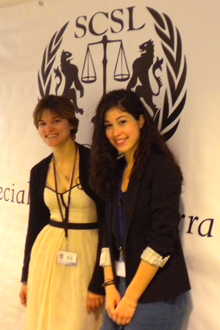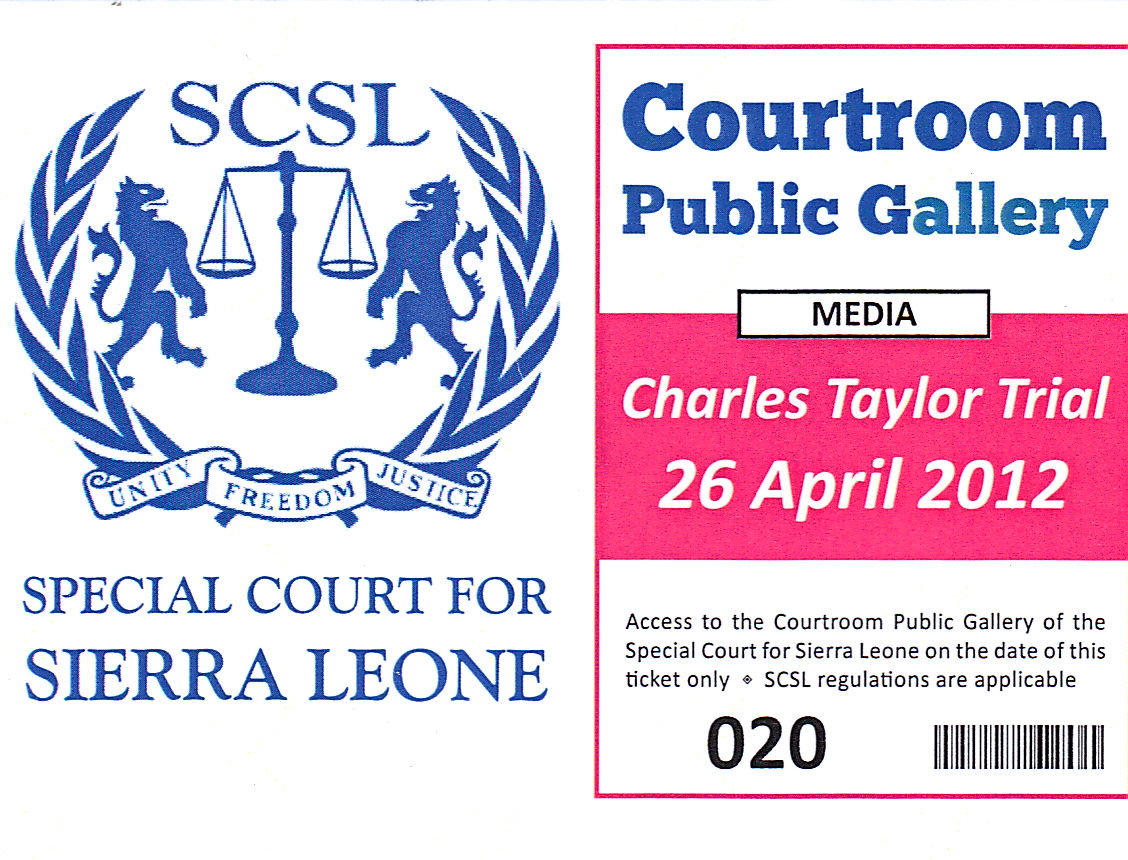Brandeis interns witness the trial of Charles Taylor
Major war crimes case decided by Special Court for Sierra Leone in The Hague

Brandeis interns in The Hague include Carly Lenhoff and Kochava Ayoun.

When the Special Court for Sierra Leone in The Hague convicted former Liberian President Charles Taylor of war crimes last week, some of the nine Brandeis undergraduates who have been studying international law and human rights in the Dutch city this semester were able to witness the epic event and reflect on its meaning for their studies.
“After a morning spent running around escorting various diplomats, civil society members, judges and the Taylor family itself, I finally saw Charles Taylor,” said Kochava Ayoun ‘14, one of the students in the spring semester Brandeis in The Hague program. “He appeared impassive, if a bit strained, as the Presiding Judge Lussick delivered a detailed recounting of the civil war that ravaged Sierra Leone in the ‘90s.”
Ayoun, a major in psychology and international and global studies, is interning with Registrar of the Special Court of Sierra Leone, where her work focuses on the projected tasks the Court must deal with when this case is closed, “such as closing the main office in Sierra Leone, handling the archives, and establishing the Residual Special Court to handle post-completion tasks such as re-expanding” if a last indictee, who is still at large, is found, she explained.
“So when my supervisor, the Deputy Registrar, offered to allow me into the courtroom, I was excited, if not surprised,” Ayoun said. “Hearing the crux of the court’s work, embodied in the Taylor trial, I realized how important it was for me to have seen the judgment with my own eyes. It reaffirmed that everything an institution does, even the day-to-day tasks and logistics, are necessary to bring about the goal of justice.”
Carly Lenhoff ‘13, another Brandeis student, is interning in the office of the legal counsel for Taylor.
Working for the Defense Office of the Special Court for Sierra Leone “reinforced my belief that a robust and comprehensive defense is a necessity to any legal system that wishes to hold any modicum of legitimacy today,” said Lenhoff, a philosophy major. “The Taylor case provides a great example; so many people I have spoken to are quick to condemn Taylor for the crimes he was indicted for without first looking at the evidence -- much of which, in fact, greatly challenges that assumption of guilt.
“Without people willing to represent Taylor, and other individuals like him, in order to ensure a fair and balanced trial, the international justice system would be at even greater risk to becoming a system of ‘victor's justice’ and kangaroo courts,” she said. “Everyone deserves a defense. Working with people who really believe in that idea and are dedicated to making it a reality truly inspires me.”
Brandeis in The Hague opens up unique options for study of legal theory and practice. Building on a strong academic base in human rights, conflict resolution and international law, students receive internships in Hague courts, human rights organizations or applied research teams.
In addition to Ayoun and Lenhoff’s internships, Brandeis interns currently are monitoring the fairness of trials at the court; planning peace initiatives in high-conflict areas including Kashmir, the Balkans and the Middle East; assisting war crimes courts for Lebanon; researching the testimony of forensic anthropologists in genocide trials and exploring how African countries are changing their human rights laws. Future Hague placements may deal with documenting gender violence in armed conflict, protecting children’s rights and promoting legal reform in national courts.
Developed at Brandeis by the programs in International and Global studies and Legal Studies, the Spring Semester Program in The Hague is open to students in all disciplines. It offers 16 units of academic credit.
The program is led and taught by Professor Richard Gaskins, director of the Legal Studies Program and the Joseph M. Proskauer Professor of Law and Social Welfare, in cooperation with faculty from Leiden University. Students live in Leiden and are fully integrated into the life of a major European university and cultural center.
Kony video is trendy, workings of international justice slow but sure. An essay by Professor Richard Gaskins.
Categories: International Affairs, Student Life





